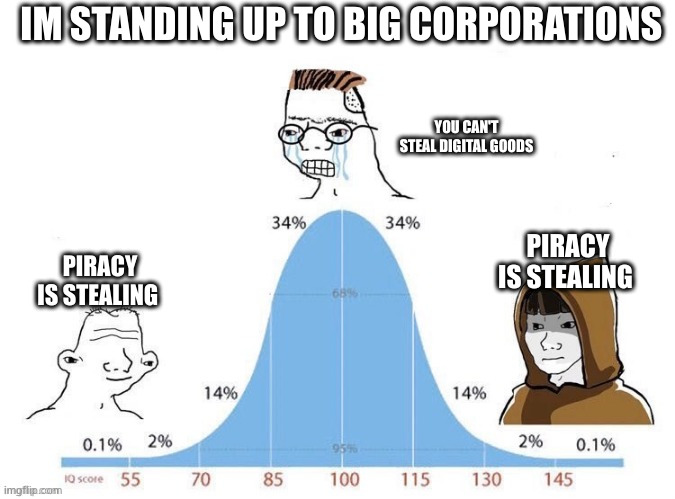Piracy explicitly is not stealing. Theft requires denying the owner of the ability to use the thing that is stolen. Copyright infringement does not meet this bar, and is not a crime in the vast majority of cases. Commercial copyright infringement is the only offense classed as a crime, which in a nutshell is piracy for profit ie selling pirated material.
Piracy explicitly is not stealing.
Piracy is attacking ships at sea and is usually done in order to rob them.
This is why you get a letter of marque to give you legitimacy. I’ve been letioning my government for one endlessly so I can attack Russian shipping in the balkans.
Piracy is best compared to riding a bus without a ticket.
that’s an interesting definition, and one that appeals to me especially as a fan of “harmless” theft (taking something that the owner will never notice is gone, nor be inconvenienced by the lack of)
It’s literally the legal definition. Copyright infringement has never been theft. Media companies have been trying to change the definition of theft, though.
It used to never be a crime, only a civil offense. This means the rightsholder has to sue you, rather than the state prosecute you, but also that the burden of proof is “the balance of probabilities”, ie whichever side tips the scale past 50/50 with their argument, rather than “beyond reasonable doubt” which is more like >99%. However in the last decade many countries have introduced “commercial copyright infringement” as a criminal offense. Off the top of my head, in the US I think the threshold for that is like $1,000 or something.
It’s not about it being “harmless” but the fact that you’re not taking something away from someone. If I steal your laptop and sell it, you no longer have a laptop. If I copy data, you still have your original copy.
This is also why there’s a different crime for “joyriding” instead of just stealing a car. If you steal a car, you might argue that you were just taking it for a drive, and never intended to permanently deprive the owner. In that case it’s easier to convict you for joyriding instead of theft.
Someone: Photographs pages of a book in a book store
OP: “Hello Police? Someone is stealing a book!”
Nicholas Cage heavily breathing about all the people simultaneously stealing the declaration of independence
Brb, stealing some documents…


My evil plans are already underway. MUHAHAHAHA
Don’t make me tap the sidebar again…
This meme is stealing.
You can steal digital goods, but to do so you have to copy it and erase the original. Otherwise its just copying.
That’s dumb. If you are supposed to pay for something and you just take it instead, you stole it. You can argue word meanings and technicallies all day, but it’s a lot easier to just be real about what we are doing here.
If you stole a car, you physically took something away from somebody. If you download a car, the original is still there - you’re just making an exact copy for yourself for free. Same if you swiped a candy bar at a gas station - you’re depriving that gas station the use of their property, which is to sell and make money. If you download a candy bar, nothing is taken and the gas station can still sell the original.
So let’s be crystal clear here: what’s happening is not theft, because nothing was taken and the owner is not deprived of the use of their property. Can you argue that you’re getting something for free when you shouldn’t? Yes, and that’s more in line of denying profits rather than actual theft.






